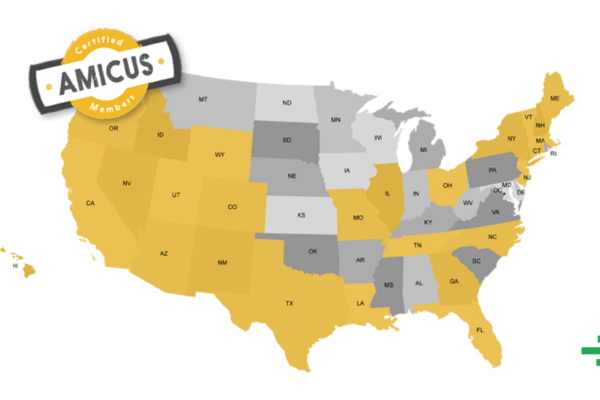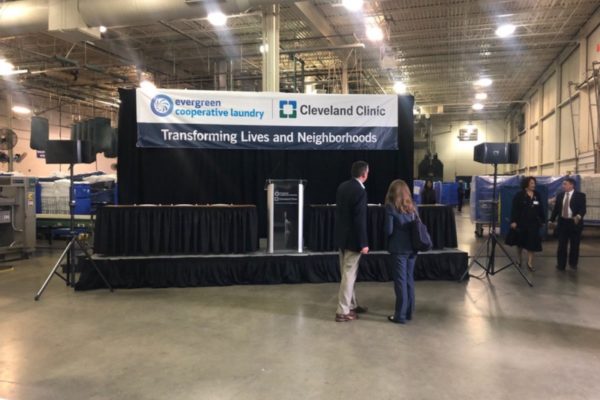Achieving Scale while Maintaining Local Impact by Sarah Stranahan Amicus Solar is one of more than 250 purchasing cooperatives in the US, including such well-known brands as Ace Hardware and Best Western Motels. By forming a large national cooperative, small producers or retailers increase their purchasing power and access to project financing, while remaining independently […]
Continue ReadingNumber of Employees Set to Triple at Evergreen Cooperative Laundry
New Contract to Operate Cleveland Clinic Laundry Drives Expansion by Jessica Rose On May 10, I stood with city dignitaries, hospital executives, and over 100 shop-floor employees to witness an historic ribbon-cutting ceremony, as Cleveland’s Evergreen Cooperative Laundry (ECL) announced it was taking over operation of the Cleveland Clinic’s massive industrial laundry facility. The mood […]
Continue ReadingColorado — “The Delaware of Cooperative Law”
Benefits to Incorporating a Worker Cooperative in Colorado by Jason Wiener and Linda Phillips Perhaps you are starting a cooperative business or maybe you are transitioning an existing business to a worker-owned cooperative. Though the process is only a little more complicated than a standard incorporation, a separate set of legal statutes apply. Called “cooperative law,” […]
Continue ReadingEmployee Ownership and Ecological Sustainability
Are mission-controlled, employee-owned companies better environmental stewards than conventional corporations? Is transitioning to employee ownership a more likely path to keeping a firms’ ecological mission alive, compared to selling a firm to a large competitor? The answer to these questions is critical to enterprise design for the 21st century and beyond. If we understand the […]
Continue ReadingCathedral Builders at South Mountain Company
A Mission-Led Employee-Owned Firm By Sarah Stranahan The best of the best is what you might say about South Mountain Company, an employee-owned, environmentally oriented design-build firm on Martha’s Vineyard, off the coast of Massachusetts. It’s a B Corp, a new type of company that uses the power of business to solve social and environmental problems. […]
Continue ReadingThe Power and Limits of Enterprise Design
The Environmental Performance Record of UK’s John Lewis Partnership By Sarah Stranahan The new economy movement often speaks of creating an economy that works for people and the planet. But are those two goals always aligned? Given limited resources and competing needs, how do businesses manage trade-offs between what’s best for people — employees, customers and communities — and […]
Continue ReadingStocks from Employee-Owned Companies Outperform S&P
Brokerage Platform Created by NCEO Allows Investors to Focus on Businesses with Shared Ownership and Inclusive Workplace CulturesT What do Southwest Airlines, Alphabet, and Etsy have in common? All are companies that have some degree of employee shared ownership and high-engagement workplace cultures. These are qualities that the National Center for Employee Ownership (NCEO) uses to determine […]
Continue ReadingHistoric Federal Law Gives Employee-Owned Businesses Access to SBA Loans
by Steve Dubb As we noted in NPQ [Nonprofit Quarterly] last fall, nearly half of US small business owners are baby boomers, aged 53 to 71. Collectively, they own 2.34 million businesses, employ 24.7 million people, and have combined sales of $5.14 trillion. It is estimated that 80 percent of these businesses lack a plan for what they are going […]
Continue ReadingEmployee Ownership: Protecting Local Businesses
The loss of local businesses is not inevitable. By Melissa Hoover Linda and Gregory Coles founded their preschool, A Child’s Place, in their Queens, NY basement in 1983. Over the years it grew steadily and developed a deeply loyal community. Now they own a large building, employ more than 50 people and serve hundreds of families. […]
Continue ReadingThe Unsung Route to Employee Ownership
Employees Purchasing Their Division From a Major Corporation By Sarah Stranahan We usually think of ESOP conversions as a way for founders to sell private businesses to their employees, because that is the most common scenario for creating ESOPs. But ESOPs can also be used for other types of business succession, like purchasing a division […]
Continue Reading









